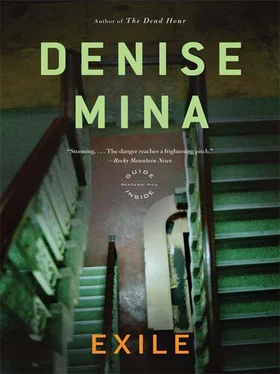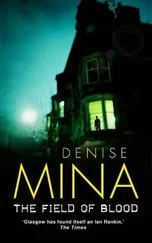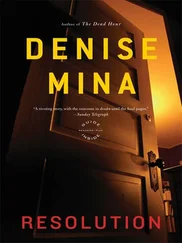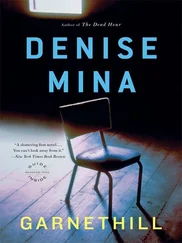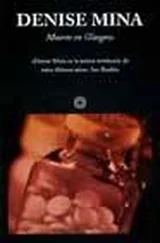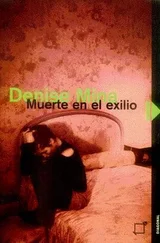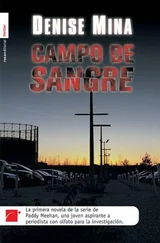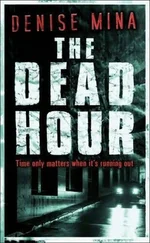
The Second book in the Garnethill Trilogy, 2001
"Kick it and see," He said. She felt the foot going into her side, a dull thud ripple through the crippling pain.
"She's dead," said the woman.
But she wasn't, she was still alive and she heard them. The ground was warm and wet beneath her. Her dry eyes were stuck open and she could see across the floor to a dirty glass by the skirting board. The woman crouched down by her. She was pulling at her wrist, tugging at the bracelet.
"Leave it," he said, but she ignored him, tugging again. "I said leave it."
The woman dropped her arm and backed off. The man shuffled into her line of vision, worn trainers, gray trousers. They were talking about her, about how to get rid of her, about getting Andy's van. The pain surged and she spasmed at the shrieking trill on her spine, the scalding whiteness behind her eyes. The searing light grew brighter and brighter until there was nothing.
POSTIE
It was minus five outside the bedroom window and Maureen's face prickled against the cold. She wanted to get out of bed, wanted a cigarette and a coffee and to be alone, but his leg was pressed tightly against hers and his hand was under her thigh. The cumulative heat was itchy and damp. She peeled their skins apart, trying hard not to wake him, but he felt her stir. He peered around at her through sleep-puffed eyes.
" 'Kay?" he murmured.
"Yeah," breathed Maureen.
She waited, watching her milky breath hover above her, listening to the wind hissing outside. Vik's breathing deepened to a soft, nasal whistle and Maureen slid into the bitter morning.
She flicked on the kettle, lit a cigarette and looked out of the kitchen window. January is the despairing heart of the Scottish winter and black clouds brooded low over the city, pregnant with spiteful rain. It came to her every morning now; it was the first thought in her head when she opened her eyes. After a wordless fifteen-year absence, Michael, her father, was back in Glasgow.
They only found out afterwards that their elder sister Marie hadn't bumped into Michael in London. She'd gone looking for him, contacting the National Union of Journalists and putting adverts in the Evening Standard. She found him living in the Surrey Docks in a high-rise council flat carpeted with empty lager cans. He was troubled with his health and hadn't worked for a long time so Una paid his fare home. Maureen told them she wouldn't see him but her insistence was needless. Liam said Michael never mentioned her, had never once spoken her name and ignored it when anyone else did. Even their mother, Winnie, was starting to wonder about that. Maureen couldn't get over the injustice of it. Michael was back in the bosom of the family and she was outcast.
The moment she heard he was home everything changed for her. It wasn't like the breakdown: she wasn't flashing back all the time and she knew it wasn't depression. It was a limitless, aching sadness that marred everything she cast her eye over. She couldn't contain it: her eyes had become incontinent, dripping stupid tears into washing-up, down her coat, into shopping trolleys. She even cried while she slept. When she stood at the window in Garnethill and looked down over Glasgow she felt her face might open and flood the city with tears. Grief distracted her entirely; it was as if her life continued in an adjacent room – she could hear the noises and see the people but she couldn't participate or care about any of it.
Vik snored loudly once and stopped. He was the only thing in her life that wasn't about the past but it was the wrong time for a fresh chapter and coy new discoveries. Maureen was seeing her father everywhere, grieving for Douglas and missing Leslie desperately. Vik knew almost nothing about her, nothing about Douglas being murdered in her living room six months ago, or Michael's late-night visits to her bedroom when she was a child, nothing about the schism in her family. Telling about Michael was the worst moment with new boyfriends: she saw them change towards her, saw them feel confused and implicated. Douglas had been different because he was a therapist. She'd never had to explain away the nightmares or the irrational phobias. Douglas was as soiled and melancholy as herself and Vik was a big, jolly boy.
She looked out of the window, took a deep draw on her fag and heard the swish of paper scraping through metal, followed by a light thud on the hall carpet. She recognized the blue hospital envelope at once – Angus was keeping busy. She picked it up and went back into the kitchen, sat down and lit a fresh cigarette from the dying tip of the old one. The envelope was made of cheap porous paper, her name and address written in a careful hand. She leaned across to the bills drawer and pulled out the pile of blue envelopes, laying all fifteen in chronological rows on the table. The writing was changing, becoming more controlled. He was getting better. Some of his letters were threatening, mostly they were gibberish, but the threats and the gibberish were evenly interspersed, regular and anticipatable. She knew the voice of random insanity from her own time in mental hospital and this wasn't it. He was a rapist and a murderer, but she wasn't afraid of him and she didn't give a shit. He was locked away in the state mental hospital. It was like being challenged to a dancing competition by a brick. Wearily, she gathered the unopened letter together with the old ones and shoved them into a drawer. She could read it later.
"Maureen?" Vik called sleepily from the bedroom. "Maureen?"
She stubbed out her fag and tried to find her voice. "Yeah?" She sounded tense.
"Maureen, come here."
She stood up. "What for?" she called.
"I've got something for you." Vik was grinning.
She brushed the hair off her face. "What sort of thing?" she said, forcing the playfulness. If she could act normal she might feel normal.
DANIEL
London is a savage city and she didn't belong there. She might never have been found but for Daniel. She would have disappeared completely, a missing splinter from a shattered family, a half-remembered feature in a pub landscape.
Daniel was having a good morning. It was a sunny January day and he was on his way to his first shift as barman in a private Chelsea club favored by footballers and professional celebrities. The traffic was sparse, the lights were going his way and he couldn't wait to get to work. He slowed at the junction, signaling right to the broad road bordering the river. He took the corner comfortably, using his weight to sway the bike, sliding across the path of traffic held static at the lights. He was about to straighten up when he saw the silver Mini careering towards him on his side of the road, the wheel-trim spitting red sparks as it scraped along the high lip of the pavement. He held his breath, yanked the handlebars left and shot straight across the road, up over the curb, slamming his front wheel into the low river wall at thirty miles an hour. The back wheel flew off the ground, catapulting Daniel into the air just as the Mini passed behind him. He back-flipped the long twenty-foot drop to the river, landing on a small muddy island of riverbank. The tide was out, and of all the urban rubble in the Thames he might have landed on, Daniel found himself on a sludge-soaked mattress.
He did a quick stock-take of his limbs and faculties and found everything in order. He thanked God, remembered that he didn't believe in God and took the credit back for himself. Staggered at his skill and reflexive dexterity, he pushed himself upright on the mattress, his left hand sliding a viscous layer off the filthy surface. Gathering the mulch into his cupped hand, he squeezed hard with adrenal vigor. A crowd of concerned passersby were leaning over the sheer wall, shouting frantically down to him. Daniel waved. "Okay," he shouted. "Don't worry. Other bloke all right?"
Читать дальше
